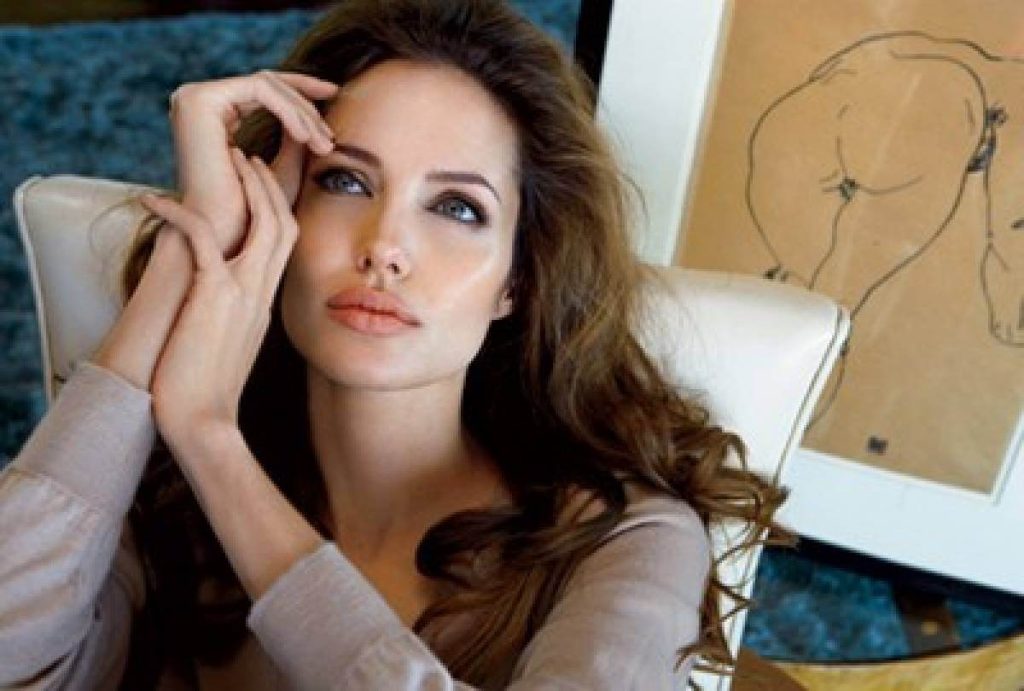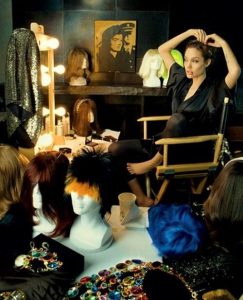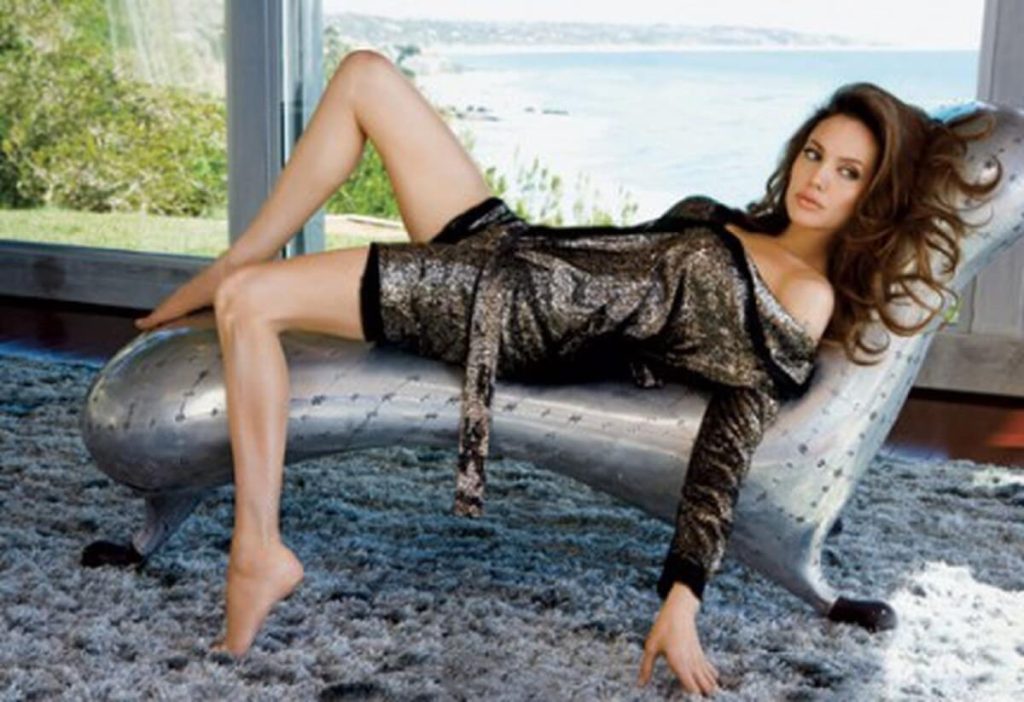“I love it,” she smiled and laughed while talking about her pregnancy. “It makes me feel like a woman. It makes me feel that all the things about my body are suddenly there for a reason. It makes you feel round and supple, and to have a little life inside you is amazing.
“Also,” she continued, dropping her voice, leaning in, “I’m fortunate. I think some women have a different experience depending on their partner. I think that affects it. I happen to be with somebody who finds pregnancy very sexy. So that makes me feel very sexy.”
Jolie was sitting in the Four Seasons Hotel in Austin, Texas. On the way to our meeting, she dropped two of her children off at the school they will be attending until Pitt wraps Tree of Life. (“I would be the worst person to explain it,” Jolie says. “I think there’s something existential about it. It’s a kind of nuclear 1950s family, and [Brad] is a strong father.”) The other children—six-year-old Maddox, three-year-old Zahara, two-year-old Shiloh, and four-year-old Pax—were being tended to, on a ranch the couple had rented, by the nannies and tutors who tag after the Jolie-Pitts in a ragged caravan.
“We don’t ever have anybody spend the night. We may have to adjust that when the next one comes. But we do have ladies that work with us, and they’re also from different cultures and backgrounds. One lady’s a Vietnamese teacher—wonderful. One is of Congolese descent from Belgium. Another is from the States and is really creative and does art programs.”

“People have made a lot out of it that we’re not [married] but we both have been married before, and it’s very easy to get married, but it’s not easy to build a family and be parents together. And maybe we’ve done it backwards, but we certainly feel married.”
When Jolie came into the Four Seasons, she looked around quickly, then crossed the floor with her head down, like someone used to being noticed. As T. S. Eliot wrote, “The roses had the look of flowers that are looked at.”
When Pitt or Jolie shoots a film (they never work at the same time; there is always a parent around), the entire family goes along, bringing familiar things from home—though there is no home—in an attempt to re-create the world as it existed in the last place, and in this way they give their children a semblance of normalcy, routine.
When I asked why she made Wanted she said, “Because I had just done A Mighty Heart and was scheduled to do Changeling, which is about the kidnapping of a child. And I had lost my mom. And I knew I was in this odd, fuzzy state going from one loss and kidnapping to another loss and kidnapping. Then Wanted came along. It’s about being physical and jumping and running and being violent, and instinctively I knew I needed to do that.”
When the waiter came over, Jolie ordered with that peculiar joy of the beautiful, well-tended woman freed by pregnancy—an omelet with everything save the peppers. When she laughed, she covered her mouth with the back of her hand. When she was moved, she looked out the window, eyes watery, far away. “After my last divorce, I said I was absolutely going to marry somebody in another field, an aid worker or something. Then I met Brad, everything I wasn’t looking for, but the best man, the best father I could possibly wish for, you know? I don’t see him as an actor. I see him very much as a dad, as somebody who loves travel and architecture more than being in movies.”
“He just has an eye for it. You hear people talk about design or buildings, and assume, especially when somebody has another career, ‘Oh, that’s a hobby.’ Like somebody coming into money appreciating Picasso. But I have seen him design, with his partners, everything from hotels to studios. Or in New Orleans, with other architects, re-doing a shotgun house with green architecture, bringing light in, angles of the sun in summer and winter, how that would affect the rooms. He’s taught me so much about the homes we live in.”
She talked about the paparazzi, how the business has changed. “It’s our media. People always slow down for a train wreck. You don’t understand why it’s there, but somehow it makes a lot of people feel better.
“In my father’s generation, the product was 80 percent of what you were putting into the world, and your personal life was 20 percent. It now seems that 80 percent of the product I put out is silly, made-up stories and what I’m wearing.”
Perhaps because she was pregnant, Jolie seemed interested mostly in talking about children. I asked what kind of parent she is, how she disciplines, rewards. She laughed. “You end up hearing yourself saying all those clichéd parent things: ‘I don’t care who started it, but I’m here to finish it.’ ”



She told me she was following a system, which she’d read about in a magazine, whereby children are rewarded with sticker stars, which can be redeemed for treats, thus not only controlling them but also teaching them the basics of capitalism. More important than any of that “is how my mom raised me, which is to figure out who I was and try to enhance my individual personality and not get in the way of it. But I can really discipline the kids when I need to.”
“When I was growing up I wanted to adopt, because I was aware there were kids that didn’t have parents. It’s not a humanitarian thing, because I don’t see it as a sacrifice. It’s a gift. We’re all lucky to have each other.
“I look at Shiloh—because, obviously, physically, she is the one that looks like Brad and I when we were little—and say, ‘If these were our brothers and sisters, how much would we have known by the time we were six that it took into our 30s and 40s to figure out?’ I suppose I’m giving them the childhood I always wished I had.”
“A nurse came with Maddox and left 10 minutes after handing him over. I stared at this little guy. I didn’t know what to do. I called my mom. I remember saying, ‘Do kids have 2 or 10 bottles a day? I’m at a loss.’ I had never babysat, let alone… ”
“We were in this little hospital in Africa when Shi was born. I don’t think there was anybody else in the hospital. It was just a little cottage, the three of us. It ended up being the greatest thing. We had wonderful doctors and nurses. It was lovely, very personal, all three in this sweet room. We had an American doctor with us, who had met the Namibian doctors, and they worked in tandem because it was a C-section and my first and we didn’t know the country. He spent a few weeks with us. There was only one pediatrician in town, and one anesthesiologist, who had to come in for that—you have to plan it.”
Where does the name Shiloh come from?
“It’s a biblical name but we didn’t name her for that. It was a name my parents almost named their first child—there was a miscarriage: Shiloh Baptist. Because my father had been shooting in Georgia and that was the most southern name [my parents] could come up with. It’s a name I always liked. I used to go under it in hotels: Shiloh Baptist. I’d gone under it when [Brad] called hotel rooms where I was staying.”
“[My mother] was Catholic but also a child of the 60s. She stopped going to confession at one point because she was having sex before marriage. To me, she represented what religion should be. She never preached. If things didn’t make sense to her, she never just accepted it. I had Communion, but she never forced me to go to church.
“Brad got me this great thing for Christmas. It’s a bookshelf that has a book on every religion. That’s how we plan to raise our kids. Teach them about all religions. They can pick one or be a student of all of them. We’ll celebrate Kwanzaa for our girl. We’ll celebrate moon and water festivals for our boys. We’ll take them to temples in certain countries. Also to church.”
As we spoke, the conversation kept cycling back to her mother, Marcheline Bertrand, who neglected her own acting career—she had studied at Strasberg—to raise her children, James and Angelina. She died in January 2007, of ovarian and breast cancer. She was 56 and had been sick for eight years. “And in those years she met all my children, helped me be a mom, helped me grow into a better woman, and taught me about dying.”
“When [my mother] passed, I realized that somebody who lives life with that kind of dedication to their family is the most noble. I was aware of it growing up. I admired her. And I loved her. But in her passing she reminded me what matters. And what’s most fun—to put yourself aside for these other little people you’re raising.”
Jolie could not talk long about her mother without her voice creaking, without tears. “Mad always knew my mom was sick. So when it happened, I sat him down and I told him how some people believe there’s a heaven where everybody goes and is together again. And they believe it’s very white and beautiful. And some believe—he’d just seen Casper—there are ghosts who are people and they are always around. And some believe it’s a long peaceful sleep. When I told him, and I was crying, ‘Grand-mère died today, we won’t be able to see her anymore, but she’ll always be around,’ he said, ‘Like she’s here now? Like she’s in that chair?’ And I said, ‘Well, I suppose she could be.’ And he accepted it. It’s funny. It’s like we teach kids the things that we want to believe. Then we see that they have such beautiful faith and it helps them go to bed and we’re in the other room not sleeping well.”
Jolie was crying when she said this.
“I had to be responsible for getting the morgue to pick her body up. She was in Cedars [Sinai, in Los Angeles]. All I had to do is remind myself that she’s my best girlfriend and she’s not in any more pain. I’m so happy for her. As much as I miss her, I’m a good enough friend not to have wanted her to stay in pain any longer.”
When Angelina was young, she watched a screening of The Champ, a remake starring her father, of the Hollywood classic. In the last scene, the boxer, pressed on by his worshipful son, wins the title, becomes the champ, then dies on the trainer’s table. When Jolie saw him, expiring, then lifeless, she thought he was dead. For real. “I freaked out.”
I ask Jolie about Coming Home—the movie for which he won the best-actor Oscar, in 1979. “Actually,” she said, “I’ve never seen Coming Home.”
What? Why?
“Because that was when my father left my mom, and the woman who he cheated on her with is in the film.” (When rumors surfaced about Jolie and Pitt, who was then married to Aniston, Jolie denied them, saying, in essence, Look, this is what happened to my mother, so I could never do it to another woman.)
Jolie’s relationship with Voight is famously dysfunctional. They do not talk. They are officially estranged. (When I asked if she had seen Midnight Cowboy, Jolie said, “You realize you’re asking somebody if they’ve seen their father play a prostitute?”)
When Voight was nominated for an Oscar in 1986 (Runaway Train), he took Jolie to the ceremony. “I remember him not winning.”
When she won her best-supporting-actress Oscar, in 2000, for Girl, Interrupted, she thanked Voight, calling him “a great actor but … a better father.”
Their relationship, always rocky, fell apart as she ascended. It happened in public, but only sort of. Voight wanted to control his daughter—that’s what some people said. Jolie broke off communication with him. Even legally dropped his name for her own (Jolie is her middle name).
When I asked Jolie about her father, she said, “We’ve decided not to be public about our relationship.”
Then: “I will say we have spoken … and hadn’t spoken for six and a half years. Which is good. Or it needed to happen.”
Then: “We don’t really have a relationship, but we’re in contact. And wish each other well.”
Then: “I think we’ve realized there’s been too much discussion. Him discussing me publicly. I’ve had to comment on him. I think it’s best that, if we try to have any relationship in the future, we do it quietly.”
“Artists raise their kids differently. We communicate to the point where we probably annoy our children. We have art around the house, we have books, we go to plays, we talk. Our focus is art and painting and dress-up and singing. It’s what we love. So I think you can see how artists in some way raise other artists.”

I met Jolie again in Washington, D.C., at the Hay-Adams, one of the oldest hotels in the country. It’s across the street from the White House. She had come to town with her two daughters—“Brad took the boys to L.A.”—to attend a ceremony, where she would give an award to the widow of murdered journalist Daniel Pearl, Mariane Pearl, who she portrayed in A Mighty Heart, then give a speech at the Council on Foreign Relations.
How did you become involved with refugees?
“I traveled to Cambodia for the first Tomb Raider. I got to this country and expected broken, angry people, and found smiling, kind, warm people. We were doing one shot, and they said, ‘Don’t move to the side, because there are mines over there.’ I’d go to the market and see the land-mine victims. That was one step in realizing there was so much of the world I was blind to.”
Jolie took several trips with the U.N., visiting, among other countries, Cambodia, Pakistan, and Sierra Leone.
“This was actually one of the things that brought us together. Though he wasn’t as publicly active, I found him to be very aware of the world, very curious, very compassionate. In his private way, he had been doing a lot. When we met, we realized our common goals were that we both wanted to be involved in the world and see what we could do. We have similar interests but different approaches. He’s more involved in rebuilding New Orleans, environmental issues, green sustainability. I am more refugees. But when it comes to common goals—orphans, orphans’ rights, children—we support each other. It brings us together and makes our relationship work.”
The conversation drifted back to the media, the paparazzi. I asked if she ever reads tabloid stories about other people, other stars.
“I would never do that because I have good friends I would be reading about and I don’t want it even in my head have a negative fairy tale about somebody I like. I don’t want it in my thoughts. I owe it to them not to pay attention. I know it’s not true. Over 95 percent of what’s said about us is entirely untrue.”